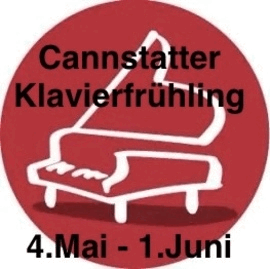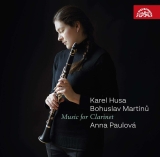Die tschechische Klarinettistin Anna Paulova widmet den größten Teil dieses Programms dem Komponisten Karel Husa (1921-2016). Sie beginnt freilich mit einer wunderbaren, unmittelbar ansprechenden Interpretation von Bohuslav Martinus Klarinettensonate, die lyrische Passagen mit höchst virtuosen mischt.
Karel Husa ist als Dirigent und Komponist bekannt. Er hat seine Heimat nach dem Zweiten Weltkrieg verlassen. 1947 komplettierte er seine Studien in Paris am Nationalen Konservatorium und an der Ecole normale de musique. Zu seinen Lehrern zählten Arthur Honegger sowie Nadia Boulanger für Komposition, André Cluytens, Eugène Bigot und Jean Fournet für Dirigieren. Dann wanderte er in die USA aus. Seine Heimat hat er aber nie vergessen. Er fand in der Folklore eine große Inspirationsquelle für seine Arbeit. Ein Großteil seiner Musik, insbesondere die Kammermusik, basiert auf den Melodien, rhythmischen Idiomen und Modalitäten der mährischen, slowakischen und allgemein slawischen Volksmusik. Oft verbindet sich mit der Musik auch eine gewisse Nostalgie.
« Die Künstler, zu denen ich aufgeschaut und von denen ich gelernt habe, sind Leos Janacek und Bela Bartok », schrieb Husa im Vorwort zu Évocation de Slovaquie für Klarinette, Viola und Violoncello (1951). Es ist ein hinreißend farbiges Werk, das hier äußerst kommunikativ und technisch auf höchstem Niveau gespielt wird. Das gilt auch für die Böhmischen Skizzen.
Deux Préludes aus dem Jahr 1965 klingt moderner und die beiden Stücke sind virtuos und technisch sehr anspruchsvoll.
Husas stets herausfordernde Virtuosität, seine belebende Klangfarben werden in der Sonata a tre mit viel Fantasie von den Interpreten bedient.
Die drei Studien für Soloklarinette ahmen im ersten Satz Vogelgesang nach, der zweite ist introvertierter und beschwörend melancholisch, mit einer zunehmende Intensität, und der letzte beschreibt eine unermüdliche Maschine. Anna Paulovas Interpretation ist faszinierend.
Czech clarinetist Anna Paulova dedicates most of this program to composer Karel Husa (1921-2016). However she begins with a wonderful, immediately appealing interpretation of Bohuslav Martinu’s Clarinet Sonata, which mixes lyrical passages with highly virtuosic ones.
Karel Husa is well known as a conductor and composer. He left his homeland after the Second World War. In 1947 he completed his studies in Paris at the National Conservatory and at the Ecole normale de musique. His teachers included Arthur Honegger as well as Nadia Boulanger for composition, André Cluytens, Eugène Bigot and Jean Fournet for conducting. Then he emigrated to the USA. However, he never forgot his homeland. He found in folklore a great source of inspiration for his work. Much of his music, especially chamber works, is based on the melodies, rhythmic idioms and modalities of Moravian, Slovak and general Slavic folk music. There is often a certain nostalgia associated with the music.
« The artists I have looked up to and learned from are Leos Janacek and Bela Bartok, » Husa wrote in the preface to Évocation de Slovaquie for clarinet, viola and cello (1951). It is a ravishingly colorful work, played here extremely communicatively and technically at the highest level. The same is true of the Bohemian Sketches.
Deux Préludes from 1965 sounds more modern and the two pieces are virtuosic and technically very demanding.
Husa’s always challenging virtuosity, his invigorating timbres are used with much imagination by the performers in the Sonata a tre.
The three studies for solo clarinet mimic birdsong in the first movement, the second is more introverted and evocatively melancholy, with an increasing intensity, and the last, describes a tireless machine. Anna Paulova’s interpretation is fascinating.






















